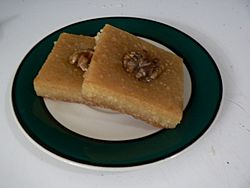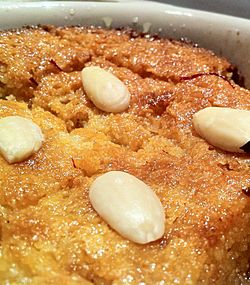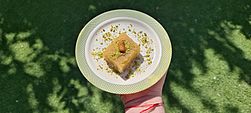Basbousa facts for kids

Basbousa topped with walnuts
|
|
| Alternative names | رواني, revani, namoura, haresh |
|---|---|
| Type | Dessert |
| Region or state | Middle East |
| Serving temperature | Cold or warm |
| Main ingredients | Semolina or farina, syrup |
Basbousa (Arabic: بسبوسة basbūsah) is a sweet, syrup-soaked semolina cake that originated in the Middle East. The semolina batter is baked in a sheet pan, then sweetened with orange flower water, rose water or simple syrup, and typically cut into diamond (lozenge) shapes or squares. It is also found in most areas of the former Ottoman Empire, and is featured in Middle Eastern cuisines, Greek cuisine, Azerbaijani cuisine, Turkish cuisine, Ethiopian cuisine, Yemeni cuisine and others.
Names
It is found in the cuisines of the Middle East, the Balkans and the North Africa under a variety of names.
- Arabic: هريسة harīsa (meaning mashed or crushed), نمورة nammoura, بسبوسة basbūsah
- Hebrew: בסבוסה basbūsah
- Armenian: Շամալի shamali
- Greek: ραβανί (ravani), ρεβανί (revani), σάμαλι (samali).
- Albanian: revani
- Turkish: revani
- Macedonian and Serbian: (ravanija), раванија
- Bulgarian: реване (revane)
- Somali: basbuusa
- Persian: روغنی
Basbousa is the most common name for this dessert in the Middle East but it may be named differently depending on the region; It is often called "hareesa" in the Levant. Note that "harissa" in North Africa is a spicy red sauce. It is a popular dessert offered in most sweets bakeries in the Middle East and especially popular in Ramadan.
Variations
Pastūsha (sometimes stylized as pastūçha) is a variant of basbousa that originated in Kuwait in the 2010s. Like basbousa, it is made from semolina soaked in sweet syrup. It is characterized by the addition of finely ground pistachios and orange flower water.
Basbousa bil ashta – a Levantine variation of basbousa filled with ashta cream in the middle.
Vegan Basbousa - Now in modern times, Basbusa is also available in vegan form using apple sauce to bind the base mix together instead of dairy and eggs.
See also
 In Spanish: Basbusa para niños
In Spanish: Basbusa para niños



